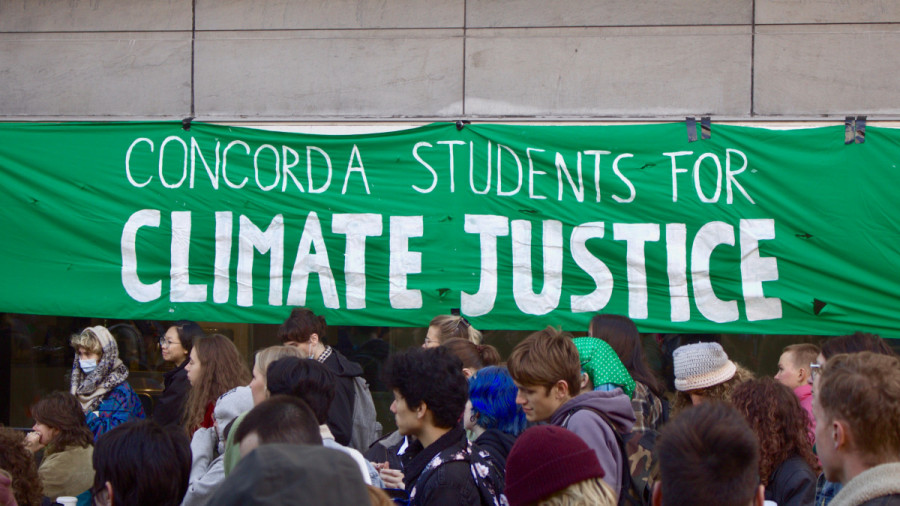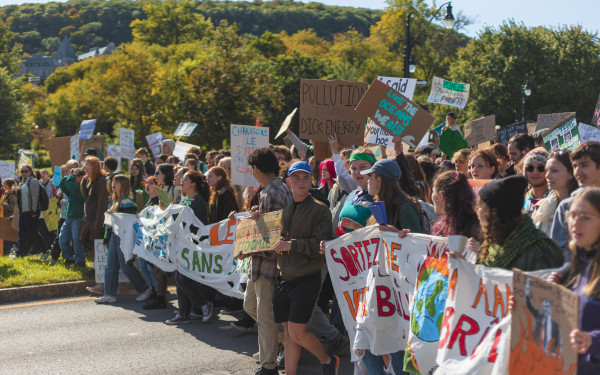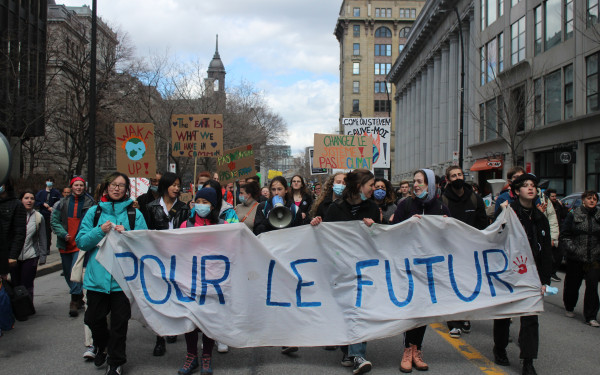Climate Justice Action: Reviving Concordia’s Progressive Student Culture
A New Student Group Is Mobilizing Students Around Environmental Justice
A group of students interested in direct action and radical politics have plans to grow their presence in the Concordia community; they are calling themselves Climate Justice Action Concordia.
Much of CJAC’s initiatives involve mobilizing students to hold Concordia accountable for its failures on sustainability. Some of the university’s environmental controversies include investing in and promoting the Royal Bank of Canada—a top financer for fossil fuels—and renewing a contract with Aramark, a company that is notorious for providing low-quality and unsustainably-sourced food to students.
The group was started in Fall 2021 and rose from discourse among students about the types of clubs and activities on campus. “It was a lot of mutual friends starting university and realizing there is a big gap in any kind of initiatives to get involved with,” said Lacey Boudreau, a student member in CJAC. “So, we had some meetings and figured out what we wanted our group to look like,” explained Boudreau.
John Nathaniel Gertler, another student member in CJAC, explained how there was “interest in hopes for the future to rebuild a combative and radical student culture at Concordia.” Students at Concordia have previously stood out among anglophone university and CEGEP campuses in Montreal, especially when it came to student organizing during the 2012 student strikes.
Gertler added that there is a general sentiment that the pandemic had gotten in the way of transitioning this activism culture to new students, and CJAC wants to revive Concordia’s.
CJAC is not an official club at Concordia, as Boudreau said that “bureaucracy is not what we want to deal with right now.” Gertler added that they “are trying to operate in a decentralized way and not have super strict hierarchies.” Obtaining official club status at the university would mean they would have to appoint executives and create various other official positions.
“Climate justice equals migrant justice equals social justice equals food justice—which are all things we are trying to change within the Concordia institution.” — Ourania Ntagizege Nima
CJAC organizes themselves within smaller working groups, where students are free to work on the projects they choose with the help of peers who have similar interests. “We use an encrypted app where we have a general group chat. We have the meetings at the SCPA basement, [which] has been working out really well; we bring food to our meetings to make them more accessible and fun,” said Ourania Ntagizege Nima, a student member in CJAC.
Gertler explained that students get involved with projects through their own initiatives. “If you are interested in doing something and it aligns with our principles, the idea is that you do it, and people help you if they are interested as well,” said Gertler.
Students are free to get involved in any way they want; whether by starting new projects, hopping on one in progress, or supporting their peers from the sidelines, Ntagizege Nima explained.
Ntagizege Nima said CJAC’s weekly meetings are open to everyone, even to those who do not want to get involved. “People can just show up to the meeting and take any information they want [...] the main goal is to mobilize students at the capacity they can,” she said.
“When someone new comes to a meeting, we share a values and principles document and let them decide for themselves. We don’t want to kick people out or force anyone in [...] we want to make this space an inclusive one,” said Gertler.
Ntagizege Nima mentioned how the organization’s name might be misleading when thinking about traditional environmentalism. “Climate justice equals migrant justice equals social justice equals food justice—which are all things we are trying to change within the Concordia institution,” she added.
“There [are] people who don’t know what intersectionality means or what a [general assembly] is or what a strike really is and how you do it,” Ntagizege Nima continued, “we want to make it as basic as we can for everyone who is interested.”
Boudreau explained, “it’s so easy to go through university and not think any of these things relate to you. Why should you care that your school is making investments in oil? There’s lots of reasons why and having conversations like that will get the most people involved.”
Gertler added, “another thing that ties us all together is an interest in engaging with the issues we learn about in class outside of academia.” Once students hit send on their papers or finish their presentation, there is no chance for them to further explore topics they are interested in with their teachers. “[Many students’] interests go further than that, and [they] feel the need to make material change in the world,” said Gertler.
Ntagizege Nima said she related to this, clarifying she gets “some type of comfort going to the meetings for CJAC,” especially when dealing with eco-anxiety.
“If these are things that speak to you and that you align with, then this space is for you,” said Gertler.




-7_600_375_90_s_c1.jpg)


